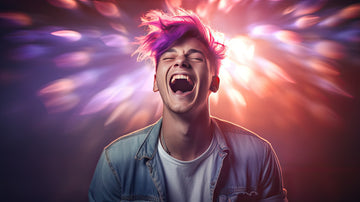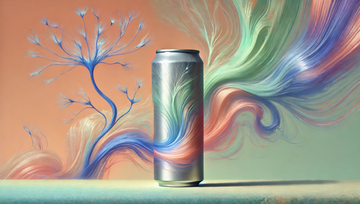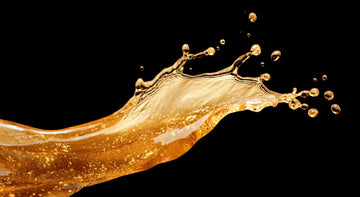By Nikhail Thakker, Dr. Christine Wong, PhD
As the clock strikes half past 3, your eyes instinctively turn from the seemingly endless workload on your desk, to the office pantry in search of a much-needed brew to power through whatever’s left to do. Sluggishly, with a fleeting spike in alertness (amongst the palpitations and jitters too), you get it all done before heading home. But then find yourself failing to fall asleep at a reasonable hour, and waking up the next morning in a state of grogginess.
Sound familiar?
As it turns out, Caffeine doesn’t actually give you an energy boost directly. Instead, it blocks adenosine receptors in your brain, which normally help promote rest (1). In fact, studies (2) have revealed that any significant caffeine uptake within 6 hours of bedtime can be seriously damaging to the quality of your sleep.
But we’re in luck! There’s an alternative to this frankly draining cycle that can be accessed just as conveniently as a cup of coffee or an energy drink. In fact, kicking out caffeine (or lowering intake) from your lifestyle will have you feeling more energized throughout the entire day, and enable you to get the rest you deserve. Here are some pointers to get you started on this revitalizing journey.
 PHOTOGRAPH BY FLOJO DRINKS
PHOTOGRAPH BY FLOJO DRINKS
1. Nootropics and Adaptogens
Perhaps you’ve stumbled upon these buzzwords before, and if you haven’t, allow us to introduce them to you. Nootropics and Adaptogens, in short, Nootropics are a group of naturally sourced compounds that enhance focus and alertness (4) while Adaptogens support stress management and return to balance.
Examples of Nootropics include American Ginseng, which can enhance short-term focus and acute memory in addition to its immunity boosting capacity (5), or Raw Cacao Extract which can boost mood and energy as well as regulate blood flow to your brain (6). Nootropics that are also adaptogens include Rhodiola and Schisandra, which support energy and cognitive performance, while also counteracting stress factors in the body (7,8).
And, no– this doesn’t mean you now have to go and spend hundreds of dollars on supplements to prime your mind to focus better. Instead, a can of Flojo contains an expertly crafted blend of 8 brain-boosting botanicals including the ones mentioned above, in addition to a B-Vitamin complex to keep you feeling vitalized throughout the day. With less than 25 calories and minimal caffeine (less than half a cup of green tea), you won’t have to worry about those crashes and sleepless nights anymore.
 PHOTOGRAPH BY GERARDO GRANADA, VECTEEZY
PHOTOGRAPH BY GERARDO GRANADA, VECTEEZY
2. Improved Snacking Habits
Though reaching for a chocolate bar or candy might bring you the most short-term satisfaction, picking more nutrient-dense snacks will allow you to control and maintain your energy levels throughout the day. Foods with lower glycemic index ratings contain macronutrients that release energy at a slower rate (3), allowing you to avoid ‘sugar crashes.’ Instead, opt for some healthy fats like a trail mix with nuts, or other snacks made with whole grains for a steady source of energy.
 PHOTOGRAPH BY OLEG GAPEENKO, VECTEEZY
PHOTOGRAPH BY OLEG GAPEENKO, VECTEEZY
3. Optimizing Sleep
The poorly-kept secret to a quality day ahead is a quality night of sleep beforehand (also check out our Part 2 of Sleep Science: Proven Tips for Better Rest). Aside from avoiding caffeine, some steps you can take to get a good night’s sleep include avoiding screens just before bedtime (9), listening to relaxing music tuned to delta waves, avoiding intense exercise in the hours of the evening (10), and spending time outdoors at sunrise and sunset.
Works Cited
- McCallum, K. Caffeine & Sleep: How Long Does Caffeine Keep You Awake? Houstonmethodist.org. https://www.houstonmethodist.org/blog/articles/2021/oct/caffeine-sleep-how-long-does-caffeine-keep-you-awake. 2023.
- Drake C; Roehrs T; Shambroom J; Roth T. Caffeine effects on sleep taken 0, 3, or 6 hours before going to bed. J Clin Sleep Med 2013;9(11):1195-1200.
- 9 tips to boost your energy — naturally - Harvard Health. (2006, June 7). Harvard Health. https://www.health.harvard.edu/healthbeat/9-tips-to-boost-your-energy-naturally
- Brody, B. What Are Nootropics? WebMD. https://www.webmd.com/vitamins-and-supplements/features/nootropics-smart-drugs-overview (accessed 2024-07-04).
- Lee, R.; Kim, J.-H.; Kim, W.-W.; Hwang, S.-H.; Choi, S.-H.; Kim, J.-H.; Cho, I.-H.; Kim, M.; Nah, S.-Y. Emerging Evidence That Ginseng Components Improve Cognition in Subjective Memory Impairment, Mild Cognitive Impairment, and Early Alzheimer’s Disease Dementia. Journal of Ginseng Research/Journal of ginseng research 2024, 48 (3), 245–252. https://doi.org/10.1016/j.jgr.2024.02.002.
- Cova, I.; Leta, V.; Mariani, C.; L. Pantoni; S. Pomati. Exploring Cocoa Properties: Is Theobromine a Cognitive Modulator? Psychopharmacology/Psychopharmacologia 2019, 236 (2), 561–572. https://doi.org/10.1007/s00213-019-5172-0.
- Emilija Ivanova Stojcheva; José Carlos Quintela. The Effectiveness of Rhodiola Rosea L. Preparations in Alleviating Various Aspects of Life-Stress Symptoms and Stress-Induced Conditions—Encouraging Clinical Evidence. Molecules 2022, 27 (12), 3902–3902. https://doi.org/10.3390/molecules27123902.
- Yan, T.; Xu, M.; Wan, S.; Wang, M.; Wu, B.; Xiao, F.; Bi, K.; Jia, Y. Schisandra Chinensis Produces the Antidepressant-like Effects in Repeated Corticosterone-Induced Mice via the BDNF/TrkB/CREB Signaling Pathway. Psychiatry Research 2016, 243, 135–142. https://doi.org/10.1016/j.psychres.2016.06.037.
- Why You Should Ditch Your Phone Before Bed. Cleveland Clinic. https://health.clevelandclinic.org/put-the-phone-away-3-reasons-why-looking-at-it-before-bed-is-a-bad-habit (accessed 2024-08-16).
- Sleep Quality and High Intensity Interval Training at Two Different Times of Day: A Crossover Study on the Influence of the Chronotype in Male Collegiate Soccer Players. Chronobiology International 2017. https://doi.org/10.1080//07420528.2016.1256301.



